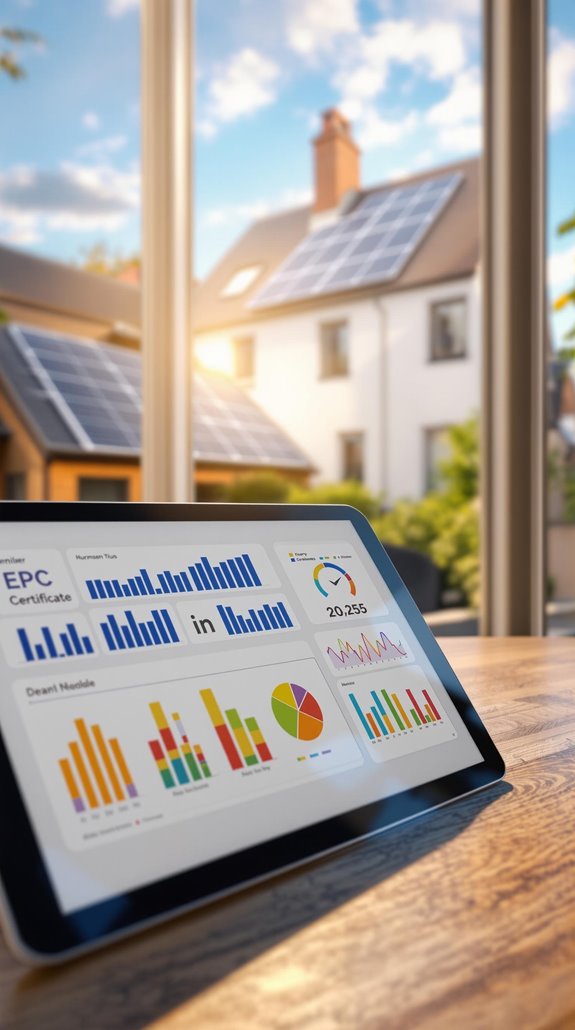I’ve been analyzing EPC costs across the UK, and you’ll find significant price variations that could impact your budget in 2025. While basic residential certificates start around £55, I’ve discovered several hidden factors that can push your final bill well beyond £120 – especially if you’re dealing with older properties or commercial spaces. The penalties for non-compliance will shock you, but there are specific strategies I’ve identified that can cut your costs substantially.
Key Takeaways
- Residential EPC certificates typically cost £55-£95 across the UK in 2025, varying by property size and location.
- London has the highest prices at £50-£120, while rural areas are 20-40% cheaper than urban locations.
- Commercial EPC assessments cost significantly more at £100-£500+, depending on property complexity and size requirements.
- Property factors like size, age, and renewable energy systems can increase assessment costs and inspection time.
- Booking during off-peak times can reduce costs by 10-15%, while urgent assessments increase standard pricing.
Understanding EPC Certificate Pricing in the UK

While EPC certificate costs vary greatly across the UK, you’ll typically pay between £55 and £95 for a standard residential property assessment in 2025. I’ve found that London pricing runs slightly different, averaging £50–£120 for domestic properties, with one-bedroom flats starting around £50 and four-bedroom houses reaching £120 in high-demand areas.
Your property type considerably impacts pricing. If you’re dealing with smaller flats, you’ll trend toward the lower end at £55, while multi-storey or extended homes command premiums up to £95. Regional variations matter too – Manchester residential costs range £40–£90, and rural areas typically undercut urban pricing by 20–40%. Comparing quotes from multiple assessors can help you secure better pricing for your property assessment. Understanding these pricing factors helps you budget appropriately for your EPC requirements.
Key Factors That Influence Your EPC Assessment Cost
Although the base price range gives you a starting point, several essential factors will push your EPC assessment cost toward either end of that spectrum. Your property’s size and layout matter most—larger homes with multiple rooms and storeys require more inspection time, directly increasing your bill. The property type also plays a vital role, with commercial buildings costing £150–£500+ while residential flats typically run £55–£70.
Older properties built before 1950 often feature outdated systems that extend assessment duration. If you’ve got renewable energy systems like solar panels or heat pumps, expect specialized evaluation costs. Modern features like smart thermostats add assessment steps too. With new EPC metrics being introduced in 2026 that focus on fabric performance and heating system efficiency, assessors may need additional time to evaluate these updated criteria. Finally, urgent bookings command premiums, while off-peak scheduling can slash costs by 10–15%.
Regional Price Variations Across Major UK Cities

Your location greatly impacts what you’ll pay for an EPC assessment, with costs varying by up to £65 between regions. I’ve found London commands the highest prices at £60–£120, driven by elevated business overheads and complex urban properties. Manchester and Birmingham follow closely at £65–£110, while Leeds and Liverpool offer slightly better value at £60–£100. As buyers increasingly favor energy-efficient homes, sellers are motivated to ensure their properties have high EPC ratings.
If you’re in Bristol or Newcastle, you’ll typically pay £55–£95, aligning closer to national averages. Scottish cities like Edinburgh and Glasgow sit at £70–£105, reflecting their distinct regulatory environment. These certificates remain valid for ten years, providing long-term value for your investment. The biggest price drivers I’ve identified include assessor operational costs, property complexity, and local competition levels. Urban areas face stricter enforcement—London fines reach £5,000 for non-compliance, which increases demand and pushes prices higher.
Commercial Vs Residential EPC Cost Breakdown
Commercial EPCs command considerably higher fees than residential assessments, with costs ranging from £100–£500+ compared to the typical £50–£120 for homes. I’ve found that commercial properties involve markedly more complex evaluations due to diverse HVAC systems, multiple usage zones, and specialized equipment requiring detailed analysis. Additionally, the costs associated with home extension projects can vary significantly based on various factors.
Small commercial units like retail shops start around £150, while large office complexes can exceed £500. The disparity stems from assessment duration—commercial inspectors spend considerably more time evaluating multiple energy systems across different building zones. Additionally, commercial assessors require specific non-domestic accreditation, which commands premium rates due to limited availability.
Residential assessments remain straightforward, covering standard heating, lighting, and insulation. Commercial properties demand expertise in industrial ventilation, complex lighting arrays, and varied occupancy patterns, justifying the substantial cost difference you’ll encounter. Unlike residential EPCs where pricing follows predictable patterns, commercial assessments must be conducted by accredited professionals who set their own rates based on complexity.
Penalty Costs for Non-Compliance With EPC Requirements

Penalties for EPC non-compliance carry substantial financial consequences that can greatly exceed the original assessment costs. I’ve seen landlords face fines up to £30,000 after April 2025, making prevention far more economical than remediation. Current penalties include £200 for missing EPCs, while renting non-compliant properties triggers £2,000 fines for short-term breaches or £4,000 for extended violations. The maximum penalty per property sits at £5,000 currently, though this’ll increase to £15,000 under proposed changes.
What’s particularly concerning is how costs compound quickly. False exemption claims add £1,000 penalties, and local authorities can publicly name non-compliant landlords. With improvement cost caps at £3,500 for band E properties, investing in compliance upfront protects you from these escalating enforcement actions that damage both finances and reputation. Commercial property landlords face even steeper penalties, with fines ranging between £10,000 and £150,000 based on rateable value.
Smart Strategies to Reduce Your EPC Certificate Expenses
Given these considerable penalty risks, implementing smart cost-reduction strategies becomes a financial imperative rather than mere convenience.
I recommend comparing quotes from multiple accredited assessors, as prices vary considerably within the £60–£120 range. You’ll often find better rates by contacting assessors directly rather than through estate agents, who typically add 10–20% markup. Utilizing an Estate Agent Fees Calculator can also help you understand the potential costs involved.
Check if your property qualifies for exemptions—listed buildings or structures under 50m² don’t require EPCs. If you’ve got an existing certificate, verify its 10-year validity period before commissioning a new assessment.
Timing matters too. Non-urgent bookings cost 15–25% less than rushed appointments. Consider bundling services or negotiating with estate agents to absorb EPC costs within their commission structure for maximum savings. Remember that property size significantly influences the final assessment cost, so smaller properties will typically fall at the lower end of the pricing spectrum.
Conclusion
I’ve covered the essential cost factors you’ll need to budget for your EPC certificate in 2025. You’re looking at £55-95 for most residential properties, with London reaching £120. Don’t forget that property size, age, and renewable systems affect pricing considerably. I recommend getting quotes from multiple assessors to find competitive rates. Remember, avoiding compliance penalties far outweighs the certificate cost, so factor this into your property investment calculations for maximum cost-effectiveness.
References
- https://moffatelectricals.co.uk/how-much-for-an-epc-in-london-uk/
- https://prochecks.co.uk/epc-pricing-2025/
- https://www.checkatrade.com/blog/cost-guides/epc-cost/
- https://acireports.co.uk/news/epc-changes-2025-what-s-changing-how-to-prepare/
- https://hoa.org.uk/advice/guides-for-homeowners/i-am-selling/how-much-does-an-epc-cost/
- https://independentepc.co.uk/epc-costs-explained-what-to-expect-in-2025/
- https://theindependentlandlord.com/new-epc-rules/
- https://www.lettingaproperty.com/landlord/blog/epc-certificates/
- https://www.gov.uk/government/publications/energy-performance-of-buildings-certificates-in-england-and-wales-technical-notes/energy-performance-of-buildings-certificates-in-england-and-wales-technical-notes
- https://www.gov.uk/government/statistics/energy-performance-of-building-certificates-in-england-and-wales-january-to-march-2025/energy-performance-of-buildings-certificates-statistical-release-january-to-march-2025-england-and-wales

